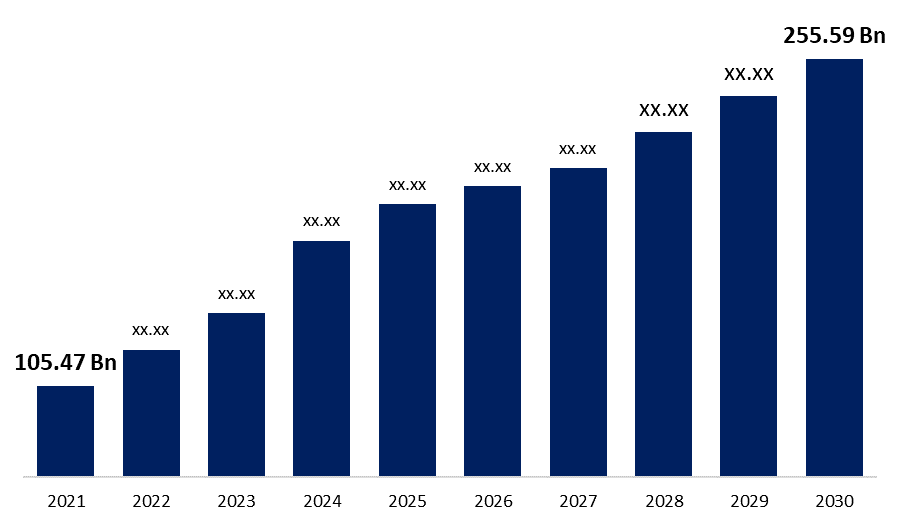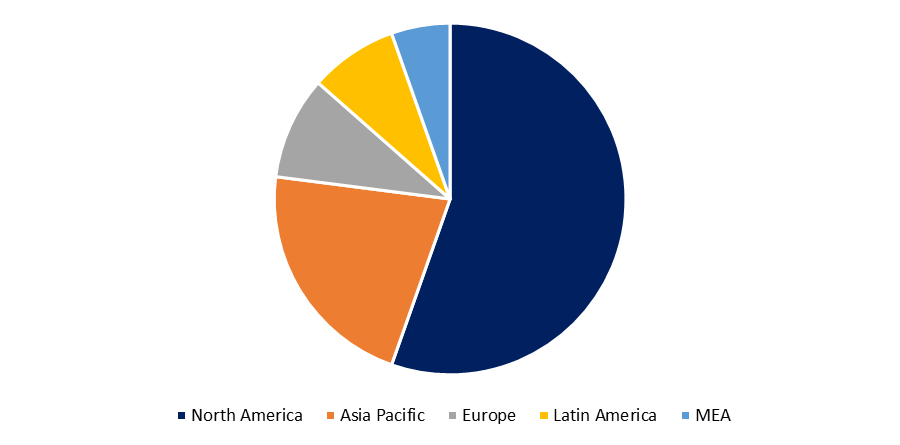Global Building Automation Control Systems Market Size, Share & Trends, COVID-19 Impact Analysis Report, By Offering (Integration and Services), By Control Type (HVAC Control, Fire Control, Lighting Control, Energy Management System, Security & Access Control, and Others), By Industry Vertical (Residential, Commercial, Industrial, Hospitality, Retail, and Others), and By Region (North America, Europe, Asia-Pacific, Latin America, Middle East, and Africa), Analysis and Forecast 2021– 2030
Industry: Information & TechnologyBUILDING AUTOMATION CONTROL SYSTEMS MARKET: OVERVIEW
The Global Building Automation Control Systems Market Size, was valued at USD 105.47 Billion in 2021. The market is projected to grow USD 255.59 Billion in 2030, at a CAGR of 11.10%. Smart linked appliances and devices are used by building automation control systems to monitor and control household activities. Customers all across the world can benefit from safety, convenience, efficient energy savings, and lower utility costs thanks to these cutting-edge smart devices. As internet of things technology is more widely used, it is projected that the market for global building automation control systems would grow.

Get more details on this report -
Additionally, it is expected that the market for automated homes would be fueled by rising millennial home ownership rates and increased disposable income in developed countries. The focus of major industry players is also on delivering cutting-edge solutions to improve the efficiency and ease of home management. For instance, in February 2020 Resido unveiled a single platform home app to manage and regulate every aspect of house operations, such as security, HVAC, and air quality.
COVID-19 ANALYSIS
The temporary closure of manufacturing facilities and the ensuing reduction in manpower had an impact on production volume across all industries. The manufacturing of devices and products for home automation dramatically fell in the first few months of 2020, and the supply chain became unstable. The economic crisis' unpredictable nature also reduced the share of money spent on smart devices. Due to this, growth was negatively impacted, and in 2020, YOY growth decreased.
The restrictions on staying at home to prevent the illness from spreading gradually increased market demand. Leading industry experts claim that this has increased demand for efficient smart devices for tracking household energy use and reducing utility expenses. Similar to that, it increased demand for other gadgets like voice-activated streaming sticks, smart TV, and set-top boxes. Many market participants saw that the stay-at-home period had been extended globally as a result of an increase in incidences.
BUILDING AUTOMATION CONTROL SYSTEMS MARKET: TREND
Construction Industry is Increasingly Adopting New Innovations and Technologies, Driving Market Expansion
The global building automation and control system market is expected to expand more quickly than expected over the course of the forecast period due to advancements in cloud computing, artificial intelligence, machine learning, and connectivity technologies. Governmental organizations from around the world are urging the development of "smart cities," where it is hoped that "smart buildings" will become the norm. The building and construction sector is anticipated to undergo a substantial shift throughout the forecast period as a result of considerable technical improvements. Modern building automation and control systems are incorporating new technologies like the Internet of Things (IoT), machine learning, Wi-Fi, and Zigbee.
Global Building Automation Control Systems Market Report Coverage
| Report Coverage | Details |
|---|---|
| Base Year: | 2021 |
| Market Size in 2021: | USD 105.47 Billion |
| Forecast Period: | 2021-2030 |
| Forecast Period CAGR 2021-2030 : | 11.10% |
| 2030 Value Projection: | USD 255.59 Billion |
| Historical Data for: | 2017-2020 |
| No. of Pages: | 195 |
| Tables, Charts & Figures: | 101 |
| Segments covered: | By Control Type, By Industry Vertical, By Region, COVID-19 Impact Analysis Report |
| Companies covered:: | ABB Ltd, Johnson Controls International plc, Crestron Electronics, Siemens AG, Control4 Corporation, Koninklijke Philips N.V, Legrand SA, Honeywell International Inc, Savant Systems LLC, Honeywell International Inc, Schneider Electric SE, Mitsubishi Electric Corporation |
| Growth Drivers: | 1)Growing Demand to Reduce Energy Consumption 2) High Initial Cost of Installation Hamper Market Growth |
| Pitfalls & Challenges: | COVID-19 has the potential to impact the global market |
Get more details on this report -
BUILDING AUTOMATION CONTROL SYSTEMS MARKET: DRIVERS
Growing Demand to Reduce Energy Consumption
Approximately 40% of the energy produced globally is used by buildings including homes and other public structures, while 60% is used by businesses and dwellings, according to the United Nations Environment Program. Additionally, uncontrolled building processes squander between 10% and 25% of their energy. In these situations, BAS helps to reduce these numbers, which is projected to promote market growth. Building automation systems also improve monitoring and management of a number of applications, which reduces costs and optimizes energy use. According to a report by the U.S. Department of Energy, building automation systems (BAS) can assist with annual energy savings ranging from 2 percent to 26 percent, with a mean save of 15 percent. BAS solutions can help by saving, on average, $0.12 per square foot annually.
BUILDING AUTOMATION CONTROL SYSTEMS MARKET: RESTRAIN
High Initial Cost of Installation Hamper Market Growth
Adoption of building automation control systems is significantly hampered by the high initial cost of installation and the protracted cost recovery timelines. Small-scale structures and shops may not be able to afford the initial installation expense due to its size. Deployment, a labor- and resource-intensive process, also calls for compatibility across software, networking equipment, hardware, databases, and other components. It is therefore projected that these issues would soon impede the growth of the global market for building automation control systems.
MARKET SEGMENTATION
The Global Building Automation Control Systems Market is segmented by Offering, Control Type, Industry Vertical, and Region. Based on the Offering, the market is categorized into Integration and Services. Based on Control Type, the market is categorized into HVAC Control, Fire Control, Lighting Control, Energy Management System, Security & Access Control, and Others. Based on Industry Vertical, the market is categorized into Residential, Commercial, Industrial, Hospitality, Retail, and Others. Based on the Region, the market is categorized into North America, Europe, Asia-Pacific, Latin America, and the Middle East and Africa.
MARKET SEGMENTATION: BY REGION
The Global Building Automation Control Systems Market is categorized into North America, Europe, Asia-Pacific, Latin America, the Middle East and Africa.
North American is anticipated to have the largest market share of the worldwide market for building automation control systems due to the building automation solutions in the residential and commercial sectors because to its existing infrastructure. The governments in the area are moving toward implementing such clever solutions due to the benefits these systems give in terms of energy conservation. The US Green Building Council oversees the LEED program, which assists local governments wanting to implement sustainable practices, along with the Bank of America Charitable Foundation. Additionally, as consumers from the residential, commercial, and industrial sectors employ excellent energy-saving tactics to incorporate building automation controls, the industry has been growing tremendously in the US.

Get more details on this report -
However, Asia Pacific is anticipated to see the greatest growth rate throughout the projected period of the global building automation control systems market due to growing financial support for smart technology. China will probably have a monopoly on the region's share because there are so many significant smart device manufacturers there. India would experience a high CAGR during the projection period due to the growing need for automated solutions. For instance, in April 2021, in response to increased customer interest and to provide easy access to home solutions, Schneider Electric collaborated with India-based house renovator Livspace.
BUILDING AUTOMATION CONTROL SYSTEMS MARKET: KEY PLAYERS
- ABB Ltd.
- Johnson Controls International plc
- Crestron Electronics
- Siemens AG
- Control4 Corporation
- Koninklijke Philips N.V
- Legrand SA
- Honeywell International Inc.
- Savant Systems LLC
- Honeywell International Inc.
- Schneider Electric SE
- Mitsubishi Electric Corporation
- Others
BUILDING AUTOMATION CONTROL SYSTEMS MARKET: RECENT DEVELOPMENT
- In November 2019, Malaysia-based EasyIO sold its Building and Energy Management System (BEMS) product line to Johnson Controls. Because of this factor, the company anticipates using EasyIO's products and staff in the global HVAC, safety, and refrigeration sectors as well as the Americas, Europe, the Middle East, and Asia-Pacific building automation systems markets.
- March 2019- Mitsubishi Electric U.S. Inc. unveiled the BEAM AX energy management system, a cloud-based system for analyzing energy use and costs in commercial buildings. Users of the energy management system can assess energy use, monitor performance, predict peak demand, spot unusual usage patterns, cut costs, and keep tabs on the efficiency and benefits of solar energy production.
BUILDING AUTOMATION CONTROL SYSTEMS MARKET: REPORT OVERVIEW
The scope of the report includes a detailed study of regional markets for Global Building Automation Control Systems Market. The Global Building Automation Control Systems Market is segmented by Offering, Control Type, Industry Vertical, and Region. It reveals the market situation and future forecast. The study also covers the significant data presented with the help of graphs and tables. The report covers information regarding the competitive outlook including the market share and company profiles of the key participants operating in the Global Building Automation Control Systems Market.
Need help to buy this report?